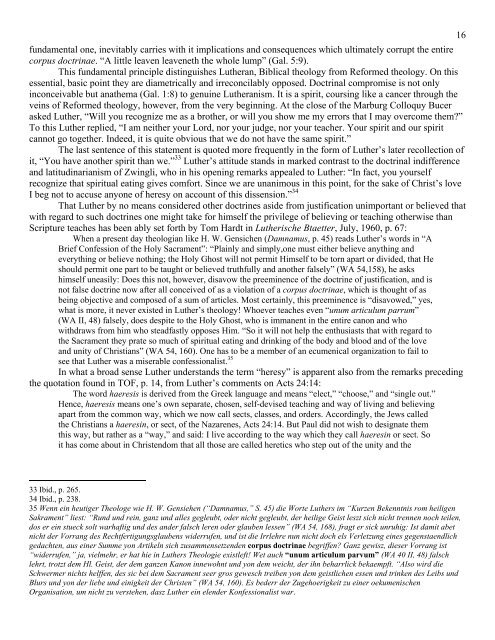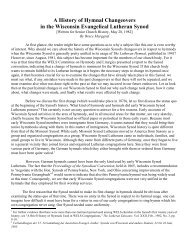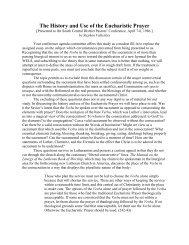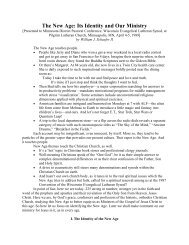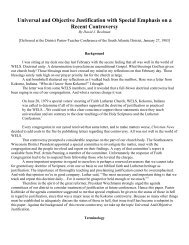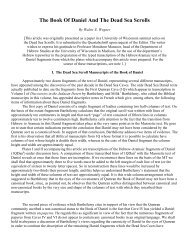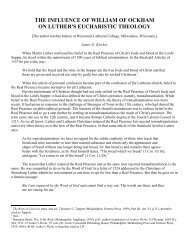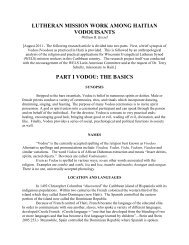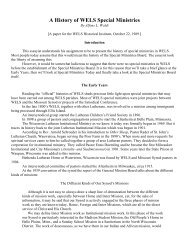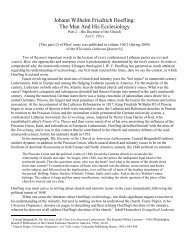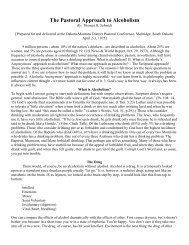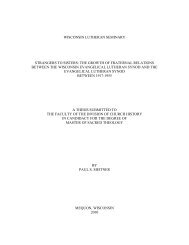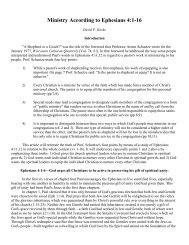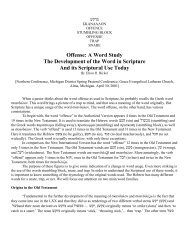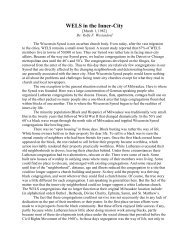What Is Heresy? - Wisconsin Lutheran Seminary Library: Essays
What Is Heresy? - Wisconsin Lutheran Seminary Library: Essays
What Is Heresy? - Wisconsin Lutheran Seminary Library: Essays
Create successful ePaper yourself
Turn your PDF publications into a flip-book with our unique Google optimized e-Paper software.
16<br />
fundamental one, inevitably carries with it implications and consequences which ultimately corrupt the entire<br />
corpus doctrinae. “A little leaven leaveneth the whole lump” (Gal. 5:9).<br />
This fundamental principle distinguishes <strong>Lutheran</strong>, Biblical theology from Reformed theology. On this<br />
essential, basic point they are diametrically and irreconcilably opposed. Doctrinal compromise is not only<br />
inconceivable but anathema (Gal. 1:8) to genuine <strong>Lutheran</strong>ism. It is a spirit, coursing like a cancer through the<br />
veins of Reformed theology, however, from the very beginning. At the close of the Marburg Colloquy Bucer<br />
asked Luther, “Will you recognize me as a brother, or will you show me my errors that I may overcome them?”<br />
To this Luther replied, “I am neither your Lord, nor your judge, nor your teacher. Your spirit and our spirit<br />
cannot go together. Indeed, it is quite obvious that we do not have the same spirit.”<br />
The last sentence of this statement is quoted more frequently in the form of Luther’s later recollection of<br />
it, “You have another spirit than we.” 33 Luther’s attitude stands in marked contrast to the doctrinal indifference<br />
and latitudinarianism of Zwingli, who in his opening remarks appealed to Luther: “In fact, you yourself<br />
recognize that spiritual eating gives comfort. Since we are unanimous in this point, for the sake of Christ’s love<br />
I beg not to accuse anyone of heresy on account of this dissension.” 34<br />
That Luther by no means considered other doctrines aside from justification unimportant or believed that<br />
with regard to such doctrines one might take for himself the privilege of believing or teaching otherwise than<br />
Scripture teaches has been ably set forth by Tom Hardt in Lutherische Btaetter, July, 1960, p. 67:<br />
When a present day theologian like H. W. Gensichen (Damnamus, p. 45) reads Luther’s words in “A<br />
Brief Confession of the Holy Sacrament”: “Plainly and simply,one must either believe anything and<br />
everything or believe nothing; the Holy Ghost will not permit Himself to be torn apart or divided, that He<br />
should permit one part to be taught or believed truthfully and another falsely” (WA 54,158), he asks<br />
himself uneasily: Does this not, however, disavow the preeminence of the doctrine of justification, and is<br />
not false doctrine now after all conceived of as a violation of a corpus doctrinae, which is thought of as<br />
being objective and composed of a sum of articles. Most certainly, this preeminence is “disavowed,” yes,<br />
what is more, it never existed in Luther’s theology! Whoever teaches even “unum articulum parrum”<br />
(WA II, 48) falsely, does despite to the Holy Ghost, who is immanent in the entire canon and who<br />
withdraws from him who steadfastly opposes Him. “So it will not help the enthusiasts that with regard to<br />
the Sacrament they prate so much of spiritual eating and drinking of the body and blood and of the love<br />
and unity of Christians” (WA 54, 160). One has to be a member of an ecumenical organization to fail to<br />
see that Luther was a miserable confessionalist. 35<br />
In what a broad sense Luther understands the term “heresy” is apparent also from the remarks preceding<br />
the quotation found in TOF, p. 14, from Luther’s comments on Acts 24:14:<br />
The word haeresis is derived from the Greek language and means “elect,” “choose,” and “single out.”<br />
Hence, haeresis means one’s own separate, chosen, self-devised teaching and way of living and believing<br />
apart from the common way, which we now call sects, classes, and orders. Accordingly, the Jews called<br />
the Christians a haeresin, or sect, of the Nazarenes, Acts 24:14. But Paul did not wish to designate them<br />
this way, but rather as a “way,” and said: I live according to the way which they call haeresin or sect. So<br />
it has come about in Christendom that all those are called heretics who step out of the unity and the<br />
33 Ibid., p. 265.<br />
34 Ibid., p. 238.<br />
35 Wenn ein heutiger Theologe wie H. W. Gensiehen (“Damnamus,” S. 45) die Worte Luthers im “Kurzen Bekenntnis rom heiligen<br />
Sakrament” liest: “Rund und rein, ganz und alles gegleubt, oder nicht gegleubt, der heilige Geist leszt sich nicht trennen noch teilen,<br />
dos er ein stueck solt warhaftig und des ander falsch leren oder glauben lessen” (WA 54, 168), fragt er sick unruhig: <strong>Is</strong>t damit abet<br />
nicht der Vorrang des Rechtfertigungsglaubens widerrufen, und ist die Irrlehre nun nicht doch els Verletzung eines gegenstaendlich<br />
gedachten, aus einer Summe yon Artikeln sich zusammensetzenden corpus doctrinae begriffen? Ganz gewisz, dieser Vorrang ist<br />
“widerrufen,” ja, vielmehr, er hat hie in Luthers Theologie existleft! Wet auch “unum articulum parvum” (WA 40 II, 48) falsch<br />
lehrt, trotzt dem Hl. Geist, der dem ganzen Kanon innewohnt und yon dem weicht, der ihn beharrlick bekaempft. “Also wird die<br />
Schwermer nichts helffen, des sic bei dem Sacrament seer gros gewesch treiben yon dem geistlichen essen und trinken des Leibs und<br />
Blurs und yon der liebe und einigkeit der Christen” (WA 54, 160). Es bederr der Zugehoerigkeit zu einer oekumenischen<br />
Organisation, um nicht zu verstehen, dasz Luther ein elender Konfessionalist war.


